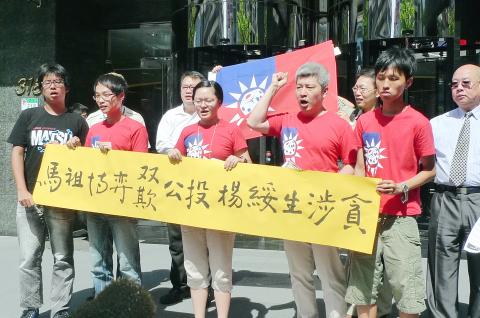The Alliance Against the Legalization of Gambling yesterday protested in front of the Agency Against Corruption following the results of a referendum last weekend which favored the construction of a casino resort on Matsu and said the agency must investigate the possibility of vote-buying during the referendum campaign.
The alliance’s executive director Ho Tsung-hsun (何宗勳), accused Weidner Resorts Taiwan — the developer behind a planned casino resort on the island — and Lienchiang County Government of deceiving residents by making unrealistic promises, such as promising monthly subsidies of NT$80,000 for Matsu residents, saying the promises were tantamount to vote-buying.
Ho said Lienchiang County Commissioner Yang Sui-sheng (楊綏生) published several articles in local newspapers to promote the casino proposal before the referendum took place and he even used public funds to buy ad space in newspapers which were designed to promote the proposal, which Ho said violated the administrative neutrality principle.

Photo: Chang Wen-chuan, Taipei Times
Ho also said Yang used the Matsu Daily, a mouthpiece of the county government, to promote the alleged advantages of the establishment of casino resorts and to influence the residents’ decision.
Ho described the popular poll as a “cheating referendum.” The alliance delivered a letter of complaint to the agency, urging it to launch an investigation.
Ho added the alliance would also file a suit with the Central Election Committee requesting that the referendum be nullified
Residents of Matsu on Saturday voted in favor of the construction of casino resorts on the outlying islands. Fifty-six percent voted in favor of the initiative, while 42 percent opposed it.
The groups said they planned to launch another referendum in three years to keep the gambling industry out of Matsu.
“In fact, the result of the referendum was not surprising,” said Buddhist Master Shih Chao-hui (釋昭慧), convener of the Alliance Against the Legalization of Gambling.
“If not for the effort of the alliance to raise anti-gambling awareness on the islands, the opposition would have secured less than 20 percent of the total votes,” she said.
The referendum and the project are not only meaningful to the residents of Matsu, but also to people in other parts of Taiwan, the master added.
If a casino resort is allowed to be established in Matsu, more casinos would be built in other regions in the country in the future, she said, adding that is why the alliance is planning to stage an anti-gambling referendum in three years.
The Referendum Act (公民投票法) stipulates that, whether a referendum proposal is adopted or vetoed, no more proposals may be raised on the same matter within three years.

Chinese Nationalist Party (KMT) Chairman Eric Chu (朱立倫), spokeswoman Yang Chih-yu (楊智伃) and Legislator Hsieh Lung-chieh (謝龍介) would be summoned by police for questioning for leading an illegal assembly on Thursday evening last week, Minister of the Interior Liu Shyh-fang (劉世芳) said today. The three KMT officials led an assembly outside the Taipei City Prosecutors’ Office, a restricted area where public assembly is not allowed, protesting the questioning of several KMT staff and searches of KMT headquarters and offices in a recall petition forgery case. Chu, Yang and Hsieh are all suspected of contravening the Assembly and Parade Act (集會遊行法) by holding

PRAISE: Japanese visitor Takashi Kubota said the Taiwanese temple architecture images showcased in the AI Art Gallery were the most impressive displays he saw Taiwan does not have an official pavilion at the World Expo in Osaka, Japan, because of its diplomatic predicament, but the government-backed Tech World pavilion is drawing interest with its unique recreations of works by Taiwanese artists. The pavilion features an artificial intelligence (AI)-based art gallery showcasing works of famous Taiwanese artists from the Japanese colonial period using innovative technologies. Among its main simulated displays are Eastern gouache paintings by Chen Chin (陳進), Lin Yu-shan (林玉山) and Kuo Hsueh-hu (郭雪湖), who were the three young Taiwanese painters selected for the East Asian Painting exhibition in 1927. Gouache is a water-based

Taiwan would welcome the return of Honduras as a diplomatic ally if its next president decides to make such a move, Minister of Foreign Affairs Lin Chia-lung (林佳龍) said yesterday. “Of course, we would welcome Honduras if they want to restore diplomatic ties with Taiwan after their elections,” Lin said at a meeting of the legislature’s Foreign Affairs and National Defense Committee, when asked to comment on statements made by two of the three Honduran presidential candidates during the presidential campaign in the Central American country. Taiwan is paying close attention to the region as a whole in the wake of a

OFF-TARGET: More than 30,000 participants were expected to take part in the Games next month, but only 6,550 foreign and 19,400 Taiwanese athletes have registered Taipei city councilors yesterday blasted the organizers of next month’s World Masters Games over sudden timetable and venue changes, which they said have caused thousands of participants to back out of the international sporting event, among other organizational issues. They also cited visa delays and political interference by China as reasons many foreign athletes are requesting refunds for the event, to be held from May 17 to 30. Jointly organized by the Taipei and New Taipei City governments, the games have been rocked by numerous controversies since preparations began in 2020. Taipei City Councilor Lin Yen-feng (林延鳳) said yesterday that new measures by